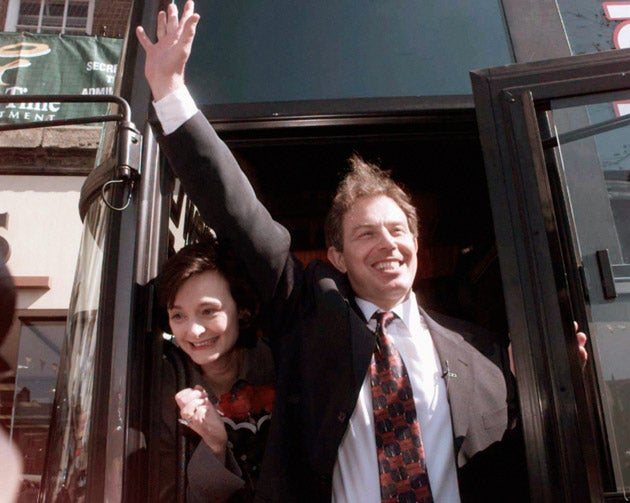Ed Miliband is no more 'red' than the Tony Blair that won the 1997 general election
The Labour leader’s temporary freeze on energy bills is a fair and moderate step


Your support helps us to tell the story
From reproductive rights to climate change to Big Tech, The Independent is on the ground when the story is developing. Whether it's investigating the financials of Elon Musk's pro-Trump PAC or producing our latest documentary, 'The A Word', which shines a light on the American women fighting for reproductive rights, we know how important it is to parse out the facts from the messaging.
At such a critical moment in US history, we need reporters on the ground. Your donation allows us to keep sending journalists to speak to both sides of the story.
The Independent is trusted by Americans across the entire political spectrum. And unlike many other quality news outlets, we choose not to lock Americans out of our reporting and analysis with paywalls. We believe quality journalism should be available to everyone, paid for by those who can afford it.
Your support makes all the difference.The reaction to Labour's policy towards energy companies was immediate and apocalyptic. The Chancellor called it “a tax on jobs, bills and pensions”. The CBI said it was legally unworkable. The Liberal Democrats said it would “hit shareholders, including those millions of people with money in pension funds”. One energy company said the policy “will undermine our ability to invest, affect jobs and increase prices”. Another warned “We may have to cut our investment programme if we face a windfall tax”. The Electricity Association claimed it could cost over 6,000 jobs.
It was 1997, and the policy was the windfall tax on the privatised utilities masterminded by Tony Blair, Gordon Brown and Peter Mandelson as a central plank of New Labour’s manifesto to promote jobs and growth. The policy was enacted. The companies paid up. It worked.
Now, Ed Miliband has promised to reset an energy market that's failing to deliver for consumers, freezing energy bills until January 2017 while the reforms are enacted, and the same alarms have sounded all over again.
The former Labour leader they once accused of being dangerously left wing is now set up as a moderate contrast to a current Labour leader they accuse of being dangerously left wing. It's a familiar criticism, but it's one that – unlike soaring energy company profits – is subject to the law of diminishing returns.
The truth is that the big six energy companies, who supply to 98 per cent of homes, are failing to give consumers a fair deal. The problem is easy to state. Energy bills have risen by an average of almost £300 for families since the election. And it is not just households that are being hit. Companies say that energy is the second biggest cost they face, after wages, and this is a major threat to their competitiveness – or even to their viability. When wholesale energy prices went up in 2008, bills went up. But when wholesale electricity prices fell by 45 per cent in 2009, household bills only fell by 5 per cent. No wonder trust has fallen and support for Ed Miliband’s stand is so strong.
‘Pro-business, pro-reform’ were Tony Blair’s mantras. The energy market needs reform to increase competition and transparency. This is exactly what Ed Miliband is proposing. When a small number of companies control both the generation and the supply of energy, it’s difficult for new players to enter the market. That’s why Labour’s pro-market, anti-monopolistic proposals are so important: breaking up the energy companies so that the parts that generate electricity are legally separate from the parts that supply consumers; and forcing all generators to sell their energy into a pool from which it is sold on the open market instead of selling it to themselves behind closed doors.
Opening up closed markets to competition and protecting consumers from monopoly-style profits is the essence of pro-business politics on the modernising right as much as the left. It was the great cause of the Republican President Teddy Roosevelt more than a century ago. For the Conservative Party to become the mouthpiece of energy monopolists is not only a political error; it is fundamentally at variance with the liberal economics they claim to espouse. Labour is today’s pro-enterprise party. It champions the businesses wanting to bring greater competition to a failed market but who find the barriers to entry too high, and the businesses who are struggling with rising bills and would save an average £1,800 from a 20-month freeze in energy prices. Six entrenched energy companies are fighting Ed Miliband’s proposals; 2.4 million businesses will welcome it.
By siding with the companies sustaining today’s energy cartel, Conservative Ministers have made a clear choice. They are standing up for the few rather than for mainstream families and businesses who are seeing the cost of living rise and their incomes squeezed.
Ed Miliband’s temporary freeze on energy bills is a fair and moderate step to protect consumers and open a failed market to competition. The vested interests opposing it should be treated with the same degree of seriousness as we now regard their pre-1997 attacks on Tony Blair.
Andrew Adonis was Head of the Number 10 Policy Unit under Tony Blair.
Join our commenting forum
Join thought-provoking conversations, follow other Independent readers and see their replies
Comments